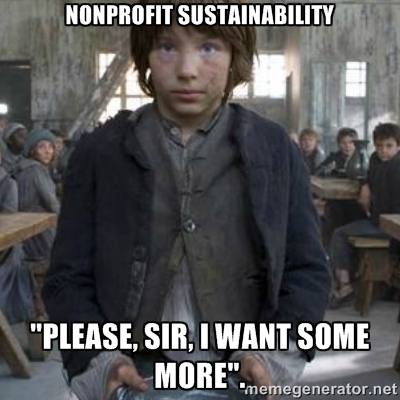 This morning, I woke up early and realized I was face-to-face with my son, Viet, who has been sleeping in the same bed with his mom and me. Looking at our sweet little baby, who was still sleeping peacefully, one tiny hand under his soft and rosy cheek, I was filled with warm fatherly thoughts. Namely: “When is this kid going to get a job and help pay for his keep?” I was tempted to wake him up and say, “You do realize that childcare for you each month is literally more than our mortgage, right? You better enjoy this while you can, little dude, because when you turn 18, you’re on your own.”
This morning, I woke up early and realized I was face-to-face with my son, Viet, who has been sleeping in the same bed with his mom and me. Looking at our sweet little baby, who was still sleeping peacefully, one tiny hand under his soft and rosy cheek, I was filled with warm fatherly thoughts. Namely: “When is this kid going to get a job and help pay for his keep?” I was tempted to wake him up and say, “You do realize that childcare for you each month is literally more than our mortgage, right? You better enjoy this while you can, little dude, because when you turn 18, you’re on your own.”
And that makes me think about the issue of sustainability of nonprofit programs. In every grant application, there is the “Sustainability Question,” which is basically, “How will you sustain this program or project when funding from the So-and-So Foundation runs out?” This seems absolutely reasonable at first glance, but honestly, it’s one of the most annoying questions we face. Most of us nonprofit professionals absolutely hate this question, and each time we see it, we have to leave our desk, go on a walk, maybe do some yoga or watch “The Daily Show,” then come back to our desk, take a deep breath, and write something like:
“We will continue to develop our staff and board’s ability to fundraise and diversify our revenues, including building relationship with other funders, as well as cultivating support from corporate sponsors and individual donors. Our special events continue to increase in revenues, and the board is leading the effort to explore earned income through program fees and the door-to-door sales of inspiring macaroni artwork made by the children in our extended-learning program.”
All of that is basically a euphemism for “We will leave you alone and bother other people.”
“Just once,” said my ED friend, Director Maureen, “here’s what I’d like to put in response to that question:”
- Program staff and the board will triple the amount of time they spend praying for money
- Program participants will be asked to pray for money to provide for their services as well
- 10% of general operating funds will be utilized to purchase Power Ball lottery tickets
- Fund development staff will regularly consult a reputable psychic to help track which direction foundations are trending to support
Why is this question so aggravating? Why does every time I answer it, I feel like crap? I sent out an email to my ED friends in the field, asking for their thoughts, and the responses were passionate and insightful. While the issue is complex and requires a lot more time to explore, I’ll try my best to summarize my colleagues’ thoughts. Overall, the Sustainability Question is annoying and frustrating because:
Sustainability is in large part determined by funders, not nonprofits. As much as we love individual donors, many of us still rely on grants, and grants are usually small and one-year in duration. We get a bunch of one-year grants that are Frankensteined together to support programs, each one with their own set of demands and restrictions, (which I explored here in “Nonprofit Funding: Ordering a Cake and Restricting it Too.”). As one ED puts it, “Why is fidelity to the mission so highly valued and expected of nonprofit leaders and staff but funders expect to ‘sleep around?‘ One year and you’re out. [They] don’t even come back and ask.” This lumbering, unwieldy, tenuous system is the antithesis of sustainability, so to ask how we nonprofits will maintain and grow our programs within it is kind of like setting a fire and asking how we will be putting it out.
Sustainability depends on the whole organization being strong, yet funders do not like providing general operating funds. Really great programs do not magically appear out of thin air. It takes real people, people who need, like, an office to work at and healthcare for their stress and carpal tunnel and stuff. These things are critical, and yet we have to constantly fight for them. “We will cultivate relationships with individual donors and corporate sponsors, etc.” sounds great, but that requires development staff, which is fundraising, and no one likes to fund “fundraising” and “admin” expenses, because those things are so frivolous and useless.
The nonprofit model is unique in that success at carrying out our missions leads to increasing costs, not revenues. The more successful programs are, the more clients they will serve, the more staff and other expenses will increase, without a proportionate increase in support. An example is VFA’s Saturday English School (SES) program, which provides English and Math support to recent-arrival immigrant and refugee students every Saturday for three hours. Five years ago, we had 30 students show up each session. Because of how awesome the program is, we now have over 150 students each session. This is a five-fold increase in number of students served. The expenses tripled, since more students means more snacks, more teaching staff, more curriculum material, etc. But funders are not going to triple the amount they provide; if we’re lucky, they’ll renew at the same level, and we’ll have to go search for other, newer funders to provide support. This is the Program Growth Paradox, where the more a program is successful and expands, the less sustainable it is.
Other reasons cited by my ED colleagues include “we know very, very well that not every program that literally changes people’s lives for the better can become self-sustaining” (but should be funded anyway, see “Nonprofit’s Ultimate Outcome: Bringing Unicorns Back to Our World“), “I have no clue where my future funds will come from so everything I say sounds like BS” and “after five or more friggin pages of explaining just HOW MUCH you need the bucks, you are now invited to totally reverse yourself” and “I will think about this and get back to you after I have several drinks to calm down.”

The most serious challenge with the Sustainability Question, however, is that it symptomatic of a divisive and patronizing system that perpetuates the unhealthy dichotomy of nonprofits as supplicants continually begging for spare change, and funders as benefactors. “How will YOU sustain this program? How will YOU sustain it after OUR funding that WE (might) give YOU runs out?” We now feel like the underemployed college-grad living in our parents’ basement, freeloading off of their good will, until they call us in for a serious talk about our future and demand to know what our plans are to find a job and inform us that it’s for our own good that in six months they will kick us out. We feel like Oliver Twist, who has to beg for another bowl of gruel from the…uh…that one guy, who serves…gruel…
OK, I haven’t read Oliver Twist.
The Sustainability Question is aggravating because the responsibility is overtly placed on nonprofits’ shoulders to fix problems in the world that we didn’t cause in the first place. Once the question is asked, “It immediately becomes somebody else’s problem,” writes one of my ED friends. It feels like funders are at the end of their ropes trying to “help” us nonprofits and if we fail to sustain our work, it is all our fault. This is not working for our field.
Every once in a while I meet a program officer who used to be a nonprofit staff. “Ah,” they sometimes reminisce, “I miss being on that side of the table.” And I would say, “Tell me what it’s like on your side of the table?” And we would talk, and I would learn that being on the other side of the table has its challenges, and that it’s not all completely awesome, with ergonomic chairs and dental AND vision insurance and with each person getting access to the company unicorn to ride to important meetings.
But that makes me think, Why the heck are we on opposite sides of the table in the first place? Aren’t we all trying to solve the same problems? Why is the relationship between funders and nonprofits so adversarial? It is ineffective. We should be on the same team, where the quarterback supports the…uh, linebacker so that he can make a, um, rim shot at the…fourth inning…
All right, I don’t know anything about sports. Point is, nonprofits and funders must be equal partners, with different but symbiotic roles, and sustainability of the work must be shouldered by both parties. We nonprofits think all the time about sustainability, even without being prompted, and we will continue to build strong programs and diversify our funding. Funders, as equal partners, should provide multi-year funds, general operating funds, capacity building assistance, and help connect us to other funders and partners. And come visit the programs once a while! We must work together to figure out how to sustain and advance the work. We have to, because the needs of and challenges facing our communities are only going to increase.
***
More on funder-fundee relationships: The Wall of Philanthropy, Wildlings, and White Walkers




